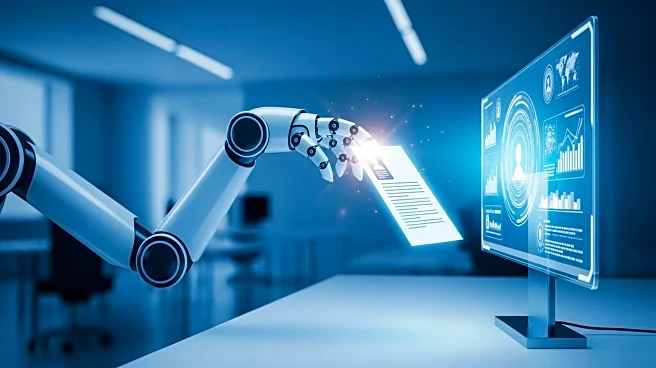What's Happening?
The traditional talent acquisition (TA) processes are being transformed by artificial intelligence (AI), as companies seek to overcome outdated systems that hinder efficient recruitment. According to recent
findings, only 17% of applicants reached the interview stage last year, with 60% abandoning their applications due to slow processes. AI, including generative and machine learning technologies, is being adopted to streamline workflows, enhance decision-making, and improve candidate experiences. The integration of AI in TA has shown to accelerate hiring, improve candidate-role matches, and provide precise talent sourcing. AI capabilities such as crafting job descriptions, personalizing candidate communications, and modeling hiring scenarios are transforming recruitment into a data-driven process.
Why It's Important?
The adoption of AI in talent acquisition is crucial for businesses to remain competitive in a fast-paced labor market. AI-driven systems reduce inefficiencies, lower hiring costs, and improve the quality of hires, which in turn boosts productivity and aligns recruitment with long-term business objectives. For candidates, AI enhances the recruitment experience, increasing engagement and strengthening the employer's brand. The shift to AI-first systems also addresses hiring biases and reduces recruiter workload, allowing them to focus on strategic tasks. However, the transition requires overcoming technical, cultural, and organizational barriers, emphasizing the need for strategic implementation and investment in recruiter development.
What's Next?
Organizations are likely to continue investing in AI-powered talent acquisition systems, with CEOs pushing for accelerated adoption. Successful implementation will require overcoming resistance to change, addressing data privacy concerns, and ensuring ethical AI practices. Companies may start by piloting AI in high-impact areas to build confidence and momentum. As AI becomes more integrated, metrics for recruitment success will evolve to include broader business outcomes. The focus will be on making AI a tool that empowers recruiters, enhancing their strategic impact rather than replacing them.
Beyond the Headlines
The ethical implications of AI in recruitment are significant, as algorithmic bias could perpetuate systemic inequities if not addressed. Responsible AI implementation demands fairness, transparency, and accountability. Organizations must ensure diverse training data and establish governance frameworks to mitigate these risks. The transition to AI-first talent acquisition is not just a technological shift but a cultural one, requiring continuous adaptation and improvement to fully realize its potential benefits.











